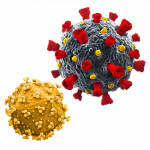A new peptide-based COVID-19 vaccine, dubbed CoVac-1, may offer greater protection for immunocompromised people with B-cell deficiencies, including patients with leukemia or lymphoma, according to study results presented at the American Association for Cancer Research (AACR) Annual Meeting this week in New Orleans.
While a majority of people with cancer respond well to the existing messenger RNA (mRNA) COVID-19 vaccines from Pfizer-BioNTech and Moderna, patients with certain blood cancers and those who receive treatments that impair the function of antibody-producing B cells do not fare as well. In some cases, such individuals do not mount an adequate antibody response (known as humoral immunity) even after one or two boosters. But current antibody levels don’t tell the whole story: T cells target virus that has entered cells (known as cellular immunity) and can prevent severe illness.
“In the clinic, we see many cancer patients who do not mount sufficient humoral immune responses after vaccination with available SARS-CoV-2 vaccines,” lead study author Juliane Walz, MD, of University Hospital Tübingen in Germany, said in an AACR press release. “These patients are thus at a high risk for a severe course of COVID-19.”
Some types of leukemia and lymphoma directly affect B cells. What’s more, many cancer patients receive treatments—for example, certain chemotherapy drugs, CAR-T therapy or stem cell transplants—that wipe out B cells and other blood cells. Organ transplant recipients and people with autoimmune conditions also take medications that impair B-cell function. The current COVID-19 vaccines rely heavily on antibodies, but enhancing T-cell response could compensate for poor antibody response.
“T-cell immune responses against SARS-CoV-2 are of particular importance for patients with B-cell deficiencies, who develop very limited antibody responses after infection or vaccination,” said Claudia Tandler, MSc, a graduate student at the University of Tübingen, who presented the study findings at an AACR press briefing. “T-cell-mediated immunity is indispensable for developing protective antiviral responses, and previous evidence has shown that T cells can combat COVID-19 even in the absence of neutralizing antibodies.”
The researchers evaluated the CoVac-1 vaccine in people with and without compromised immunity. CoVac-1 contains six SARS-CoV-2 epitopes that were shown to be recognized by T cells in people who recovered from COVID-19. The vaccine components are derived from different parts of the virus—including nucleic acid and envelope peptides—not just the spike protein used in the approved mRNA vaccines.
“CoVac-1 is designed to induce broad and long-lasting SARS-CoV-2 T-cell immunity, even in individuals who have impaired ability to mount sufficient immunity from a currently approved vaccine, and thus protect these high-risk patients from a severe course of COVID-19,” Waltz noted.
The team first tested the safety and efficacy of CoVac-1 in people with normal immune function. They found that all recipients maintained robust T-cell responses for at least three months after vaccination—including responses against omicron and other SARS-CoV-2 variants—with minimal side effects. The vaccine triggered both CD4 helper T-cell and CD8 killer T-cell responses.
They then conducted a Phase I/II clinical trial (NCT04954469) that enrolled immunocompromised people. The Phase I part included 14 patients: two with primary (congenital) immune deficiency, four with chronic lymphocytic leukemia, four with mantle cell lymphoma and four with follicular lymphoma. The Phase II part enrolled 40 additional participants, including people with more types of blood cancer. Nearly 90% had previously received approved COVID-19 vaccines but did not mount an antibody response. The participants were given a single subcutaneous injection of CoVac-1 in the abdomen and were monitored for up to six months.
After just two weeks, 71% of participants in the Phase I part had good T-cell immune responses, rising to 93% after a month. In the combined Phase I/II population, 86% responded at day 28. The most common side effects were mild to moderate injection site reactions and flu-like symptoms.
In fact, although responses varied among individuals, Tandler reported that, on average, the potency of T-cell responses in CoVac-1 recipients exceeded those seen in people with B-cell deficiencies after mRNA vaccination and were comparable to those of people with normal immune function after SARS-CoV-2 infection.
“These results identify CoVac-1 as promising vaccine candidate for cancer and other immunocompromised patients with immunoglobulin deficiency,” the investigators concluded.
Based on the promising Phase I/II findings, they are now preparing to launch a Phase III clinical trial to evaluate CoVac-1 in a larger population of immunocompromised people.
Click here to read the study abstract.
Click here for more reports from AACR 2022.
Click here for more news about COVID-19.







Comments
Comments